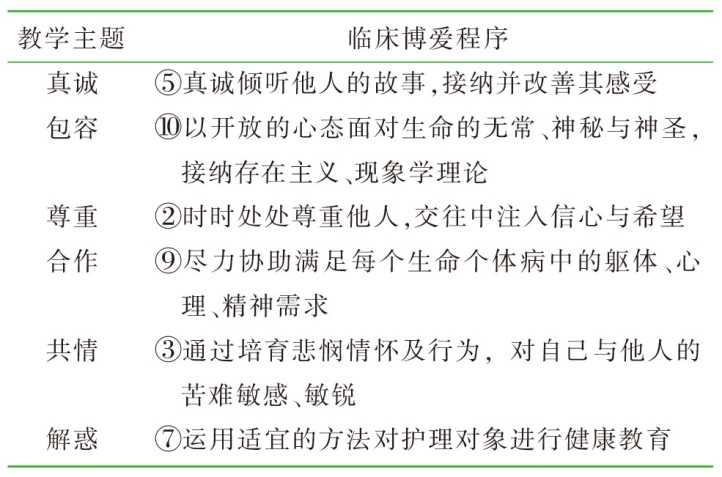| [1] |
国家卫生健康委. 医学人文关怀提升行动方案(2024-2027年)[EB/OL]. (2024-09-29)[2024-10-04]. https://www.gov.cn/zhengce/zhengceku/202410/content_6979036.htm.
|
| [2] |
中共中央, 国务院. “健康中国2030”规划纲要[EB/OL]. (2016-10-25)[2021-03-24]. http://www.gov.cn/zhengce/2016-10/25/content_5124174.htm.
|
| [3] |
国家卫生健康委. 全国护理事业发展规划(2021-2025年)[EB/OL]. (2022-04-29)[2024-10-04]. https://www.gov.cn/zhengce/zhengceku/2022-05/09/content_5689354.htm.
|
| [4] |
石嫣, 段志光. 基于文献计量分析的护理人文教育视域思考[J]. 中华护理教育, 2024, 21(6):645-652.
|
| [5] |
贾启艾. 人文护理学概念生成与理论构建[J]. 中国医学伦理学, 2021, 34(1):117-122,128.
|
| [6] |
许娟, 刘义兰, 张丰健, 等. 综合医院护理人员人文关怀培训课程的构建与应用[J]. 护理学杂志, 2021, 36(15):54-56.
|
| [7] |
刘义兰, 翟惠敏. 护士人文修养[M]. 3版. 北京: 人民卫生出版社, 2022:22-24.
|
| [8] |
Zhang J, Tian YY. Final-year nursing students' perceptions of humanistic education in nursing:a cross-sectional descriptive study[J]. BMC Med Educ, 2024, 24(1):392.
doi: 10.1186/s12909-024-05377-3
pmid: 38594668
|
| [9] |
托马斯·默里. 真实性学习:如何设计体验式、情境式、主动式的学习课堂[M]. 彭相珍,译. 北京: 中国青年出版社, 2021:120-135.
|
| [10] |
Nachtigall V, Shaffer DW, Rummel N. Stirring a secret sauce:a literature review on the conditions and effects of authentic learning[J]. Educ Psychol Rev, 2022, 34(3):1479-1516.
|
| [11] |
Lee J, Campbell S, Choi M, et al. Authentic learning in healthcare education:a systematic review[J]. Nurse Educ Today, 2022, 119:105596
|
| [12] |
胡洁. 护理的温度:护患沟通实案及分析100例[M]. 北京: 人民卫生出版社, 2020.
|
| [13] |
Ndawo G. A model to facilitate authentic learning in nursing education[J]. Glob J Health Sci, 2020, 11(9):1.
|
| [14] |
Nkongho NO. Measurement of nursing outcomes[M]. New York: Springer, 1990:3-16.
|
| [15] |
马语莲. 本科护生人文关怀能力现状及相关因素的研究[D]. 蚌埠: 蚌埠医学院, 2012.
|
| [16] |
Stürmer K, Fütterer T, Kron S, et al. What makes a simulation-based learning environment for preservice teachers authentic? The role of individual learning characteristics and context-related features[J]. Eur J Psychol Educ, 2024, 39(4):3277-3299.
|
| [17] |
王素云, 代建军. 指向真实性学习的“经验”探析[J]. 教育理论与实践, 2021, 41(5):3-6.
|
| [18] |
Banas JR, York CS. Authentic learning exercises as a means to influence preservice teachers' technology integration self-efficacy and intentions to integrate technology[J]. Australas J Educ Technol, 2014, 30(6):728-746.
|
| [19] |
黄琼蕾, 刘敏, 唐瑭. 护理人文关怀教学模式在基础护理学实训中的应用研究[J]. 中华护理教育, 2023, 20(10):1181-1184.
|
| [20] |
Hu S, Chen J, Jiang RZ, et al. Caring ability of nursing students pre-and post-internship:a longitudinal study[J]. BMC Nurs, 2022, 21(1):133.
|
| [21] |
梁鑫悦, 王秋静, 李燕, 等. 医护人员医学叙事能力的研究进展与思考[J]. 中国护理管理, 2021, 21(7):1107-1111.
|
| [22] |
邢红军, 龚文慧, 赵玉萍. 论关键能力的构成及其对教育教学的启示[J]. 教育科学研究, 2021(7):5-10.
|
| [23] |
任海静, 王恩军, 王彦, 等. 认知-体验-反思训练提升护理本科生人文关怀能力的效果研究[J]. 中华护理教育, 2023, 20(3):279-283.
|
| [24] |
项久雨. 品读“00后”大学生[J]. 人民论坛, 2019(9):112-114.
|
| [25] |
路佳慧, 顾玲玲, 文稀, 等. 本科护理人文关怀课程的设计与教学实践研究[J]. 中华护理教育, 2025, 22(3):288-293.
|
| [26] |
谭美晶, 廖月玲, 刘晓宜, 等. 提升大学生对失智症认知度和友善度教育方案的设计与实践[J]. 中华护理教育, 2024, 21(4):421-426.
|
| [27] |
孙欣, 黎海鸥, 魏莱, 等. 本科护理伦理学课程的建设与成效分析[J]. 中华护理教育, 2025, 22(3):294-298.
|




